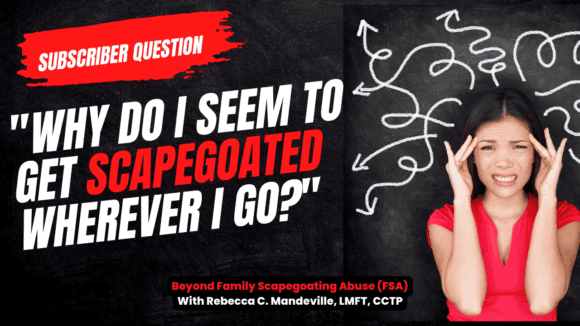New Vlog Release – and announcing a new series on YouTube on my new Beyond Family Scapegoating Abuse Channel, Subscriber Question of the Week:
This week’s subscriber question is: “Why do I seem to find myself in the ‘scapegoat’ role wherever I go?”
Video Description: Were you the scapegoat in your family-of-origin and now it seems like you end up in the ‘scapegoat’ role at work, church, school, or other groups or organizations you are involved with?
Do you wonder why this might be so?
The answer is complex and may surprise you – especially for those who have been scapegoated by family since early childhood. Join the author of ‘Rejected, Shamed, and Blamed’, psychotherapist Rebecca C. Mandeville, as she addresses this question from a ‘Beyond Family Scapegoating Abuse’ subscriber in a holistic manner that includes a brief discussion of how early childhood brain development and complex trauma (C-PTSD) can contribute to your being scapegoated beyond your family-of-origin.
Have a question about family scapegoating abuse? Feel free to leave your question in the comments here or on this video’s comment section.

Hello Rebecca!
Wow.. right now I feel pretty good. I’ve watched many of your videos and know how far I have come on my own because I kept saying “Yep” and “No kidding” as I was listening.
I’ve been mostly no contact with my family of origin since I left my life with them behind in 2016. I didn’t really understand fully what the truth of my family was but I was an empathic, gifted child that was scapegoated. I had an army of abusers as I had 7 siblings (two are now deceased) and a narcissistic mother (I am still unsure what kind she is). My father died when I was 10. I knew from a very young age that something was terribly wrong in my family. There was no love there to be found.
When I finally left, my safe place was a mini van and a dog to love me.. and I then travelled the country (Australia) after my breaking/ awakening at the age of 47. All I knew at the time was I must leave everything I had and know if my life is going to change. And I did.
No point describing my hellish life because you accurately describe it in your videos. I am finally seeing a psychiatrist in 3 days time to get help and support in recovering further, so thank you for all your videos and information because I feel now that I know which road I need to take to heal myself! And today is the first time I have felt that it’s possible.. and that’s a great feeling! I finally have hope for my future!
Keep up the good work! And thank you!
Antonia ?❤️
Hi Antonia, your message brought me such joy and made my weekend. I am excited for you as you take this next step in your healing and recovery journey. Please let me know how it goes and so glad you are now getting professional help. I suggest you also get assessed for complex trauma symptoms – very common with FSA. I know a lot of psychiatrists are now recommending my book to their patients – your psychiatrist might be open to taking a look at it to better understand what you are wanting to heal from. Warmly, Rebecca
This is something that I’ve been wondering about for years, like did I have something written on my forehead? I’ve only started to understand what goes on very recently by working very hard at tracking triggers. So much to unpack and untangle. I’d like to vanquish the demons all attached to my older sister, and feel that I’m getting closer to believing that I’m capable. Thanks so much for your work. It’s very intricate and invaluable to us survivors.
Thank you, E. Many feel that way, “Is there a sign on my back saying “Scapegoat me”? This book is very helpful, by Janina Fisher, you may want to check it out in regard to understanding and tracking triggers, etc. https://www.scapegoatrecovery.com/product/5177/
Great video Rebecca. It makes a lot of sense and gave me a lot of food for thought. Is it the past experiences that come into the present and expecting to be scapegoated? I know personally I am always on the lookout for it and I suppose the better way to be is to not to let any preconceived notions rule my thoughts. It’s hard to undo.
Hi Diana, thanks for the comment. Glad you liked the video. This is why I continuously bring up the idea of “releasing the scapegoat narrative” – to completely dis-identify from it. This is a necessary step in fully recovering from FSA. People (including family) can throw those negative and distorted narratives at you, but they don’t need to ‘stick’. I discuss this in my video, ‘Are you trapped in the family scapegoat role’ on my YouTube channel, btw.
I think I’m capable of getting to the no-stick stage. I’m not grieving the lost family anymore, but I’m astonished and freaked out that the scape goaters direct such abuse at us and basically get away with it. It really seems so sick to me now.